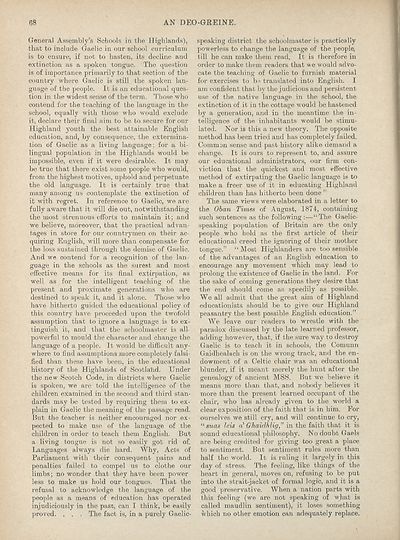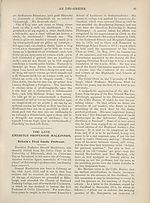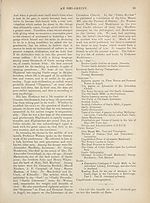An Comunn Gàidhealach Publications > Deo-gréine > Volume 10, October 1914-September 1915
(76) Page 68
Download files
Complete book:
Individual page:
Thumbnail gallery: Grid view | List view

68
AN DEO-GREINE.
General Assembly’s Schools in the Highlands),
that to include Gaelic in our school curriculum
is to ensure, if not to hasten, its decline and
extinction as a spoken tongue. The question
is of importance primarily to that section of the
country where Gaelic is still the spoken lan¬
guage of the people. It is an educational ques¬
tion in the widest sense of the term. Those who
contend for the teaching of the language in the
school, equally with those who would exclude
it, declare their final aim to be to secure for our
Highland youth the best attainable English
education, and, by consequence, the extermina¬
tion of Gaelic as a living language; for a bi¬
lingual population in the Highlands would be
impossible, even if it were desirable. It may
be true that there exist some people who would,
from the highest motives, uphold and perpetuate
the old language. It is certainly true that
many among us contemplate the extinction of
it with regret. In reference to Gaelic, we are
fully aware that it will die out, notwithstanding
the most strenuous efforts to maintain it; and
we believe, moreover, that the practical advan¬
tages in store for our countrymen on their ac¬
quiring English, will more than compensate for
the loss sustained through the demise of Gaelic.
And we contend for a recognition of the lan¬
guage in the schools as the surest and most
effective means for its final extirpation, as
well as for the intelligent teaching of the
present and proximate generations who are
destined to speak it, and it alone. Those who
have hitherto guided the educational policy of
this country have proceeded upon the twofold
assumption that to ignore a language is to ex¬
tinguish it, and that the schoolmaster is all-
powerful to mould the character and change the
language of a people. It would be difficult any¬
where to find assumptions more completely falsi¬
fied than these have been, in the educational
history of the Highlands of Scotland. Under
the new Scotch Code, in districts where Gaelic
is spoken, we are told the intelligence of the
children examined in the second and third stan¬
dards may be tested by requiring them to ex¬
plain in Gaelic the meaning of the passage read.
But the teacher is neither encouraged nor ex¬
pected to make use of the language of the
children in order to teach them English. But
a living tongue is not so easily got rid of.
Languages always die hard. Why, Acts of
Parliament with their consequent pains and
penalties failed to compel us to clothe our
limbs; no wonder that they have been power
less to make us hold our tongues. That the
refusal to acknowledge the language of the
people as a means of education has operated
injudiciously in the past, can I think, be easily
proved. . . . The fact is, in a purely Gaelic¬
speaking district the schoolmaster is practically
powerless to change the language of the people,
till he can make them read. It is therefore in
order to make them readers that we would advo¬
cate the teaching of Gaelic to furnish material
for exercises to bs translated into English. I
am confident that by the judicious and persistent
use of the native language in the school, the
extinction of it in the cottage would be hastened
by a generation, and in the meantime the in¬
telligence of the inhabitants would be stimu¬
lated. Nor is this a new theory. The opposite
method has been tried and has completely failed.
Common sense and past history alike demand a
change. It is ours to represent to, and assure
our educational administrators, our firm con¬
viction that the quickest and most effective
method of extirpating the Gaelic language is to
make a freer use of it in educating Highland
children than has hitherto been done ”
The same views were elaborated in a letter to
the Oban Times of August, 1874, containing
such sentences as the following :—“ The Gaelic¬
speaking population of Britain are the only
people who hold as the first article of their
educational creed the ignoring of their mother
tongue.” “Most Highlanders are too sensible
of the advantages of an English education to
encourage any movement which may lead to
prolong the existence of Gaelic in the land. For
the sake of coming generations they desire that
the end should come as speedily as possible.
We all admit that the great aim of Highland
educationists should be to give our Highland
peasantry the best possible English education.”
We leave our readers to wrestle with the
paradox discussed by the late learned professor,
adding however, that, if the sure way to destroy
Gaelic is to teach it in schools, the Comunn
Gaidhealach is on the wrong track, and the en¬
dowment of a Celtic chair was an educational
blunder, if it meant merely the hunt after the
genealogy of ancient MSS. But we believe it
means more than that, and nobody believes it
more than the present learned occupant of the
chair, who has already given to the world a
clear exposition of the faith that is in him. For
ourselves we still cry, and will continue to cry,
u suas leis a’ Ghaidhlig,” in the faith that it is
sound educational philosophy. No doubt Gaels
are being credited for giving too great a place
to sentiment. But sentiment rules more than
half the world. It is ruling it largely in this
day of stress. The feeling, like things of the
heart in general, moves on, refusing to be put
into the strait-jacket of formal logic, and it is a
good preservative. When a nation parts with
this feeling (we are not speaking of what is
called maudlin sentiment), it loses something
which no other emotion can adequately replace.
AN DEO-GREINE.
General Assembly’s Schools in the Highlands),
that to include Gaelic in our school curriculum
is to ensure, if not to hasten, its decline and
extinction as a spoken tongue. The question
is of importance primarily to that section of the
country where Gaelic is still the spoken lan¬
guage of the people. It is an educational ques¬
tion in the widest sense of the term. Those who
contend for the teaching of the language in the
school, equally with those who would exclude
it, declare their final aim to be to secure for our
Highland youth the best attainable English
education, and, by consequence, the extermina¬
tion of Gaelic as a living language; for a bi¬
lingual population in the Highlands would be
impossible, even if it were desirable. It may
be true that there exist some people who would,
from the highest motives, uphold and perpetuate
the old language. It is certainly true that
many among us contemplate the extinction of
it with regret. In reference to Gaelic, we are
fully aware that it will die out, notwithstanding
the most strenuous efforts to maintain it; and
we believe, moreover, that the practical advan¬
tages in store for our countrymen on their ac¬
quiring English, will more than compensate for
the loss sustained through the demise of Gaelic.
And we contend for a recognition of the lan¬
guage in the schools as the surest and most
effective means for its final extirpation, as
well as for the intelligent teaching of the
present and proximate generations who are
destined to speak it, and it alone. Those who
have hitherto guided the educational policy of
this country have proceeded upon the twofold
assumption that to ignore a language is to ex¬
tinguish it, and that the schoolmaster is all-
powerful to mould the character and change the
language of a people. It would be difficult any¬
where to find assumptions more completely falsi¬
fied than these have been, in the educational
history of the Highlands of Scotland. Under
the new Scotch Code, in districts where Gaelic
is spoken, we are told the intelligence of the
children examined in the second and third stan¬
dards may be tested by requiring them to ex¬
plain in Gaelic the meaning of the passage read.
But the teacher is neither encouraged nor ex¬
pected to make use of the language of the
children in order to teach them English. But
a living tongue is not so easily got rid of.
Languages always die hard. Why, Acts of
Parliament with their consequent pains and
penalties failed to compel us to clothe our
limbs; no wonder that they have been power
less to make us hold our tongues. That the
refusal to acknowledge the language of the
people as a means of education has operated
injudiciously in the past, can I think, be easily
proved. . . . The fact is, in a purely Gaelic¬
speaking district the schoolmaster is practically
powerless to change the language of the people,
till he can make them read. It is therefore in
order to make them readers that we would advo¬
cate the teaching of Gaelic to furnish material
for exercises to bs translated into English. I
am confident that by the judicious and persistent
use of the native language in the school, the
extinction of it in the cottage would be hastened
by a generation, and in the meantime the in¬
telligence of the inhabitants would be stimu¬
lated. Nor is this a new theory. The opposite
method has been tried and has completely failed.
Common sense and past history alike demand a
change. It is ours to represent to, and assure
our educational administrators, our firm con¬
viction that the quickest and most effective
method of extirpating the Gaelic language is to
make a freer use of it in educating Highland
children than has hitherto been done ”
The same views were elaborated in a letter to
the Oban Times of August, 1874, containing
such sentences as the following :—“ The Gaelic¬
speaking population of Britain are the only
people who hold as the first article of their
educational creed the ignoring of their mother
tongue.” “Most Highlanders are too sensible
of the advantages of an English education to
encourage any movement which may lead to
prolong the existence of Gaelic in the land. For
the sake of coming generations they desire that
the end should come as speedily as possible.
We all admit that the great aim of Highland
educationists should be to give our Highland
peasantry the best possible English education.”
We leave our readers to wrestle with the
paradox discussed by the late learned professor,
adding however, that, if the sure way to destroy
Gaelic is to teach it in schools, the Comunn
Gaidhealach is on the wrong track, and the en¬
dowment of a Celtic chair was an educational
blunder, if it meant merely the hunt after the
genealogy of ancient MSS. But we believe it
means more than that, and nobody believes it
more than the present learned occupant of the
chair, who has already given to the world a
clear exposition of the faith that is in him. For
ourselves we still cry, and will continue to cry,
u suas leis a’ Ghaidhlig,” in the faith that it is
sound educational philosophy. No doubt Gaels
are being credited for giving too great a place
to sentiment. But sentiment rules more than
half the world. It is ruling it largely in this
day of stress. The feeling, like things of the
heart in general, moves on, refusing to be put
into the strait-jacket of formal logic, and it is a
good preservative. When a nation parts with
this feeling (we are not speaking of what is
called maudlin sentiment), it loses something
which no other emotion can adequately replace.
Set display mode to:
![]() Universal Viewer |
Universal Viewer | ![]() Mirador |
Large image | Transcription
Mirador |
Large image | Transcription
| An Comunn Gàidhealach > An Comunn Gàidhealach Publications > Deo-gréine > Volume 10, October 1914-September 1915 > (76) Page 68 |
|---|
| Permanent URL | https://digital.nls.uk/125240376 |
|---|
| Description | Leabhar 10, Mìos Deireannach an Fhogharaidh 1914 gu Darna Mìos an Fhogharaidh 1915 |
|---|---|
| Attribution and copyright: |
|
| Description | This contains items published by An Comunn, which are not specifically Mòd-related. It includes journals, annual reports and corporate documents, policy statements, educational resources and published plays and literature. It is arranged alphabetically by title. |
|---|
| Description | A collection of over 400 items published by An Comunn Gàidhealach, the organisation which promotes Gaelic language and culture and organises the Royal National Mòd. Dating from 1891 up to the present day, the collection includes journals and newspapers, annual reports, educational materials, national Mòd programmes, published Mòd literature and music. |
|---|---|
| Additional NLS resources: |
|

